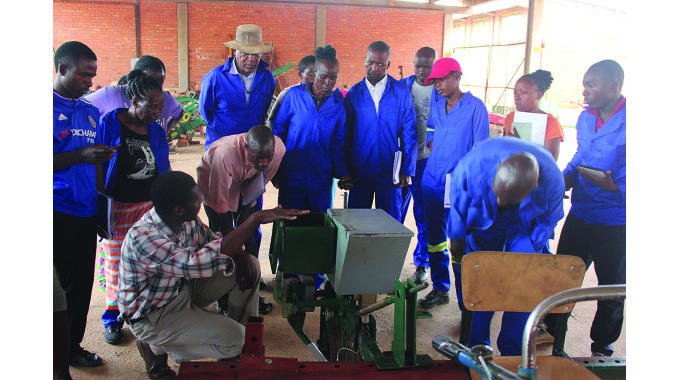Training helps improve farmers’ business acumen

Obert Chifamba
Agri-Insight
IT goes without saying that farmers always have their plates full and may easily disremember the importance of signing up for the occasional seminar or training course to refresh their minds on their farming goals.
Such an eventuality in most cases sees production taking a knock, with farmers failing to identify where their projects would have gone off the rails.
It is against such background that the Government recently decided to ramp up efforts to boost production in the commercial agriculture sector through training farmers on the correct use of fertilisers, pesticides and herbicides.
Essentially, the Government’s decision comes in the wake of perceived growing cases of yield losses because of inappropriate application of fertilisers, pesticides and herbicides, which all point towards rising incidences of human error that is detrimental to production.
Under such circumstances, it is more painful for farmers to miss out on good yields because of such avoidable errors even if the natural conditions could have been conducive for good harvests than to lose to natural disasters like droughts.
Some farmers perform poorly not because they do not have resources, but simply because of poor deployment of those resources at their disposal, no matter how bulky they might be.
Such farmers will, therefore, benefit immensely from the training, as they will get some enlightenment on how they should be running their operations.
In cases where the farmer is aware that the training might be difficult to comprehend, it may make sense to send the manager or a selected representative to later teach other workers instead of just ignoring.
It is fast becoming apparent that most farmers are yet to appreciate that farming is a business in which the smooth and effective lining of nooses requires constant learning.
Government, through Agritex and working closely with partners, has, therefore, duly launched a countrywide training programme, which started in Harare recently as a way of addressing the problem.
The training will serve to remind farmers that timing, applying the correct quantities of such inputs as fertilisers, herbicides and pesticides, to name a few and the proper use of implements is crucial every time for competitive results.
Trainings are, therefore, reminders on the way the farmers should be doing business to enhance crop yields and quality for better financial rewards.
It is exciting to note that the Government has even lined up a series of training sessions on use of chemicals to ensure they are safe for people, environment and animals.
This is done pre and post-harvest at various levels and will mark the difference between developing and not having profit and failure, observed Agritex chief agronomist, Rutendo Nhongonhema recently.
The training will, besides enabling farmers to set goals for their farm businesses, provide businesses with the leeway to continue evolving and growing while the farmers will also be improving their knowledge.
It is crucial for farmers to realise that training will help them gain practical skills in what they will be doing, as the courses usually focus on different components of farming, for instance, growing mixed vegetable crops for direct markets and other crops for external markets and or domestic purposes.
The training in most cases will leave farmers equipped with ideas on how to navigate market opportunities and even manage risks while exposing the requirements for penetrating various markets as well.
On the one hand, the farmers will also gain knowledge on designing business plans to guide their operations and enhance their understanding of the skills and resources needed for successful farm business ownership.
Low agricultural productivity and limited adoption of new agricultural technologies by farmers are key development challenges facing many farmers across the country and even outside the borders.
To this end, the Government has also come in handy, pushing for the adoption of modern agricultural technologies currently in use to bridge the information gap that is leaving them unable to plan against the various vagaries of weather militating against successful farming.
Of course, many farmers still find it difficult to learn about new technologies on their own, hence the decision by the Government to also equip extension officers with modern communication technologies, such as tablets, so that they can easily disseminate information to those farmers who may be technology shy.
The other advantage of farmer training is that the skilled ones can also teach others in their villages on the use of improved practices through demonstration plots and lessons.
In fact, the farmer training programmes are complementary to the other components of technical advice that farmers get from extension agents or even works of literature.
Interestingly, a farmer-to-farmer training model can also be an effective approach to agricultural extension, especially when reinforced by an existing formal extension system.
Some people doing farming for the first time are less likely to have grown up on a farm, which means there is an increased need for hands-on training opportunities.
Through training, they can learn how to better manage both the business and agricultural aspects of their farms.
Generally, training equips farmers with important skills to orient them to the correct utilisation of the new technologies, instruct débutante ones on the business aspect of farming and allow them to profit from their wages.
All aspects of such training allow farmers to not only be more productive in terms of agriculture, but also how to properly leverage their crops once grown.
Training helps to make up the gap that exists between the amount of labour put in and the output of most farming enterprises.
It is, however, sometimes critical to have farmers running such trainings and workshops.
It is also not rocket science that it makes great sense to have farmers in the teaching and building of such programmes, as they are the ones with the most knowledge about what it is actually like to work the land.
Additionally, these farmers can help specialise training programmes to specific regions, thereby maximising their effectiveness.
People planning such training programmes must, however, be alive to the fact that a “one size fits all” concept may not work effectively with farming, as programmes that work for certain regions, even in the same country, might not work in others, due to differences in crops, soil and conditions.
Training is in essence the bedrock of many other pushes to increase agricultural productivity.
Farmers can, therefore, not be expected to know how to properly utilise new technologies without training, and thus, any technologies implemented without proper farmer training could very well prove to be ineffective and useless.









Comments